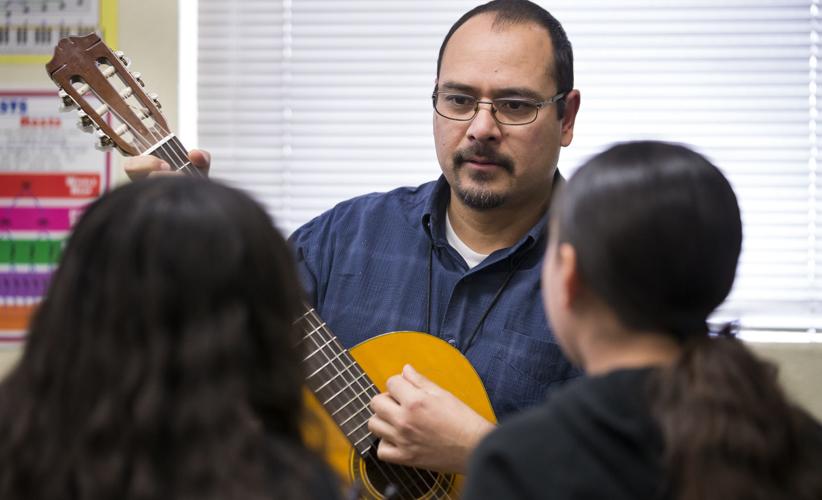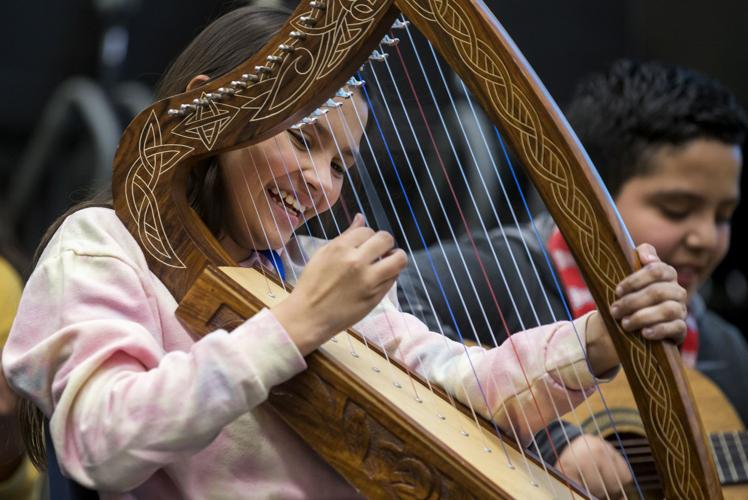A clutter of sound turns into polished music as the Roskruge mariachi group goes from tuning up to practicing their set. Rehearsing in the K-8 bilingual school, these kids are serious musicians, continuing a tradition that is woven into the fabric of Tucson’s culture.
While many of the kids grew up with mariachi in their homes, others are creating a new tradition. They’re learning the instruments that characterize the music — the guitarrón, vihuela, trumpets, violin, the traditional singing and more.
But there is one part of the children’s performance that is incomplete: They don’t have the matching traditional garb.
Mariachi Los Pumas de Roskruge is looking to raise $12,000 through a GoFundMe for matching trajes de charro for an upcoming international competition.
The Tucson International Mariachi Conference, in April, is three days of workshops that ends with a competition where Roskruge has the opportunity to win prizes that would enhance their music program.
Outside the open door to the boisterous rehearsal, Yvette Martinez bounces her youngest child on her knee. Her 14-year-old, Christopher Santa Cruz, is playing trumpet with the group while Martinez’s other two young children rally around her in the hallway.
When Martinez started her son with trumpet at Davis Elementary, she introduced him to a tradition of music that began with her grandmother. Martinez played mariachi as a kid, first taught by Alfredo Valenzuela, who started the Davis program Mariachi Aguilitas, and later in a private group with his daughter. And now Alfredo’s son, Rodolfo Valenzuela, teaches Christopher.
Martinez said having the traditional outfit is important for the children’s confidence — a confidence that spills into other aspects of the students’ lives, teaching them discipline, determination and appreciation of tradition.
“It helps their self-esteem, being well dressed. It makes them feel important,” she said. “For all the hard work they do, it’d be nice for them to be in their trajes and carry the mariachi tradition with pride.”
A complete traditional outfit costs about $300 or more if you add in a mariachi hat. This is too expensive for many of the Roskruge families. Those who can’t afford the traditional traje wear a white button down, plain black pants or skirts, and bow ties and hair ties that the school lends out. The traditional pants have plata down the side, the silver trim synonymous with mariachi.
When the students take part in competitions, they aren’t judged only on the quality of their music but their overall presentation.
“The kids feel invincible when they have the traje,” says Rodolfo Valenzuela, the Roskruge mariachi teacher. “It’s just like playing sports. If you don’t show up with your uniform, it doesn’t feel right.”
Rodolfo Valenzuela’s father, Alfredo Valenzuela, started the Davis program in the early ’90s, and Rodolfo Valenzuela began assisting him when he was in high school.
Rodolfo Valenzuela has been teaching the mariachi group at Roskruge for 20 years, and his sister Myrna Salinas joined last year, focusing on violin instruction. Rodolfo Valenzuela’s daughter, Araceli, also now teaches her own private group. Alfredo Valenzuela is retired now, and his other son Jaime Valenzuela is the Davis director.
The Valenzuela family has basically raised a generation of Tucson mariachi players. Many local musicians began at Davis then went on to Roskruge then Tucson, Pueblo or Cholla high schools, Rodolfo Valenzuela says.
That mariachi pipeline has created lasting friendships, said Roskruge seventh-grader Isabella Ferreira, who went to Davis and has been playing the violin since she was 4.
“My whole family loves mariachi,” she said. “The trajes and the singing — it’s so fun.”
At home, her family listens to mariachi and sings along, with Ferreira’s cousins often imploring her to sing. At home she’s shy but not with Los Pumas.
Long dark curls hanging by the sides of thick-framed glasses, Ferreira is palpably shy when talking about herself. But when she talks about playing mariachi with the group, her face lights up. When singing and playing with Mariachi Los Pumas, she is confident, and she says having matching trajes would only enhance that feeling.
“It would look more professional,” she said. “It makes us more confident.”
If enough money can be raised for the trajes, the outfits will stay with the school when this group of students moves on and get passed down to the next class. They can buy a couple new outfits each year to replace any that are wearing out.
The Roskruge parent who started the GoFundMe, Christina Berry, grew up listening to mariachi and danced folklorico as a kid.
“It’s important for me to pass that on to my children, that sense of community,” she said. “Tradition is really important, and music itself is so beneficial for their brain and their learning.”
Her seventh-grader, Xristian Berry, has been doing mariachi since he was 6 years old at Davis. Starting with the violin, still his main instrument, he’s also learned to play guitarrón, piano, trumpet and vihuela.
“They sound great, but the kids would love to have these traditional outfits,” Berry said. “Their showmanship, their confidence, would really go up.”







